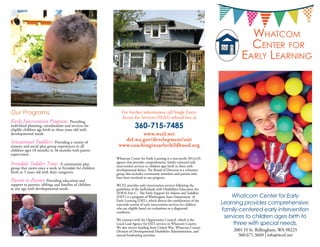
ELbrochure2015
- 1. Whatcom Center for Early Learning is a non-profit 501(c)(3) agency that provides comprehensive, family-centered early intervention services to children ages birth to three with developmental delays. The Board of Directors is a volunteer group that includes community members and parents who have been involved in our program. WCEL provides early intervention services following the guidelines of the Individuals with Disabilities Education Act (IDEA) Part C. The Early Support for Infants and Toddlers (ESIT) is a program of Washington State Department of Early Learning (DEL), which directs the coordination of the statewide system of early intervention services for children who are eligible based on evaluations or a diagnosed condition. We contract with the Opportunity Council, which is the Local Lead Agency for ESIT services in Whatcom County. We also receive funding from United Way, Whatcom County Division of Developmental Disabilities Administration, and annual fundraising activities. For further information call Single Entry Access for Services (SEAS) referral line at 360-715-7485 www.wcel.net del.wa.gov/development/esit www.coachinginearlychildhood.org Whatcom Center for Early Learning provides comprehensive, family-centered early intervention services to children ages birth to three with special needs. 2001 H St. Bellingham, WA 98225 360.671.3660 | info@wcel.net Whatcom Center for Early Learning Our Programs Early Intervention Program: Providing individual planning, coordination and services for eligible children age birth to three years old with developmental needs. Sensational Toddlers: Providing a variety of sensory and social play group experiences to all children ages 18 months to 36 months with parent supervision. Ferndale Toddler Time: A community play group that meets once a week in Ferndale for children birth to 5 years old with their caregivers. Parent to Parent: Providing education and support to parents, siblings and families of children at any age with developmental needs.
- 2. We believe that parents and caregivers are the most important people in a child’s life, and that young children learn best when they are doing activities they find fun and interesting in their home and community. We also believe that daily routines and activities provide a great opportunity to develop foundational and functional skills. Our team is composed of therapists, Early Childhood Special Educators, and Family Resources Coordinators that partner with families throughout Whatcom County to enhance and strengthen the capacity of the caregiver to understand and support their child with developmental needs. Our early intervention services offer a research based service delivery model that is referred to as the “Primary Service Provider” (PSP) approach, which designates one team member from the WCEL team to serve as a service provider to the family and child. The provider is chosen based on family priorities and a child’s developmental needs. Coaching is the is a process and style of interaction used by the staff to build the capacity of family members and other important care providers to promote the child’s learning and development in ways that are unique to each family and child. The provider also receives coaching from the WCEL team, and joint consultation with another team member is available when needed. Each family also has a Family Resources Coordinator that supports coordination and planning, and assists the family to access resources as needed. Research has shown that supporting the child and family’s interests, routines, rituals, and priorities promotes a child’s existing abilities and learning of new skills. The expected outcomes of early intervention services include: • Children will demonstrate positive social-emotional skills including social relationships with others, acquire and use knowledge and skills, and use appropriate behav- iors to meet their needs. • Parents and caregivers will know their parent rights, effectively communicate their child’s needs, and help their child develop and learn. The benefits to children include: • Increased well-being, resilience and self sufficiency. • Greater involvement in community life. • Increased readiness to learn and participate in school programs. The benefits to families include: • Increased confidence and competence in the ability to provide learning opportunities and advocate for their children. * Vital connections with community resources and networking with other families facing similar challenges. The benefits to the community include: • 30% of toddlers exiting from early intervention no longer need special education services. • Children and families are able to be active and successful participants in the community during the early childhood years and into the future in a variety of settings-in their homes with their families, in child care and preschool.